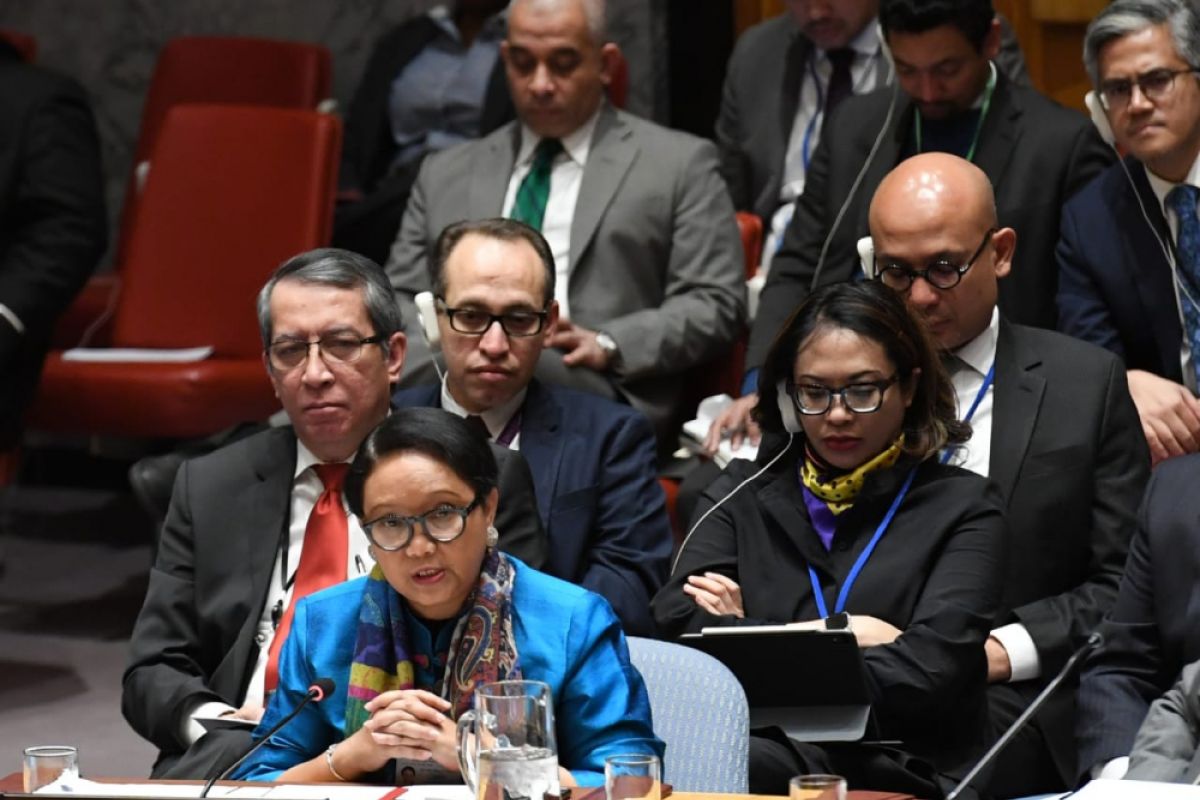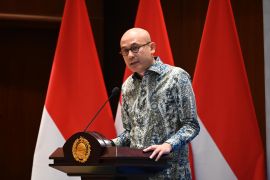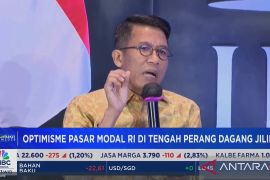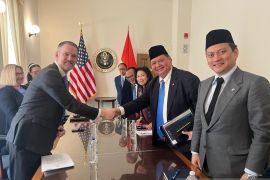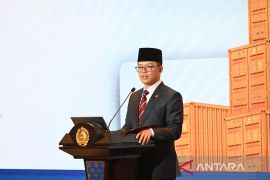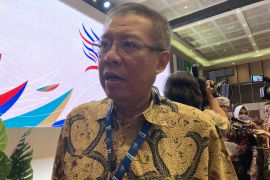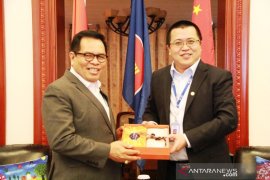A trade war between the world`s major economic powers will obviously affect other economies. Hence, all countries, including Indonesia, must address this condition through economic diplomacy.
The Indonesian government, under President Joko Widodo`s administration, has made economic diplomacy as the third priority of Indonesia`s foreign policy. Economic diplomacy is viewed as one of the pillars supporting national economic independence aimed at contributing as much as possible to the welfare of the people.
Acceleration of economic diplomacy
Earlier, some 134 heads of Indonesian representatives abroad had agreed to commit to accelerating Indonesia`s economic diplomacy to overcome various global economic challenges.
The commitment was stated at the Indonesian Heads of Representatives` Working Meeting that was also attended by the minister of industry, minister of trade, and head of the Investment Coordinating Board (BKPM).
The acceleration of economic diplomacy was aimed at achieving several targets, one of which is to improve the performance of Indonesia`s exports. In fact, one of the reasons behind the decline in Indonesia`s export performance was the country lagging behind in the completion of free trade agreements with trading partners.
Hence, Indonesian Minister of Trade Enggartiasto Lukita had outlined two main strategies to be implemented to improve the performance of Indonesia`s exports, specifically expansion of the export destination market and faster completion of negotiations on free trade agreements. Moreover, Indonesia has targeted to become a trade hub for the Southeast Asia region by 2020.
In addition to the trade issue, the issue of investment is also one of the priorities in Indonesia`s economic diplomacy efforts. On the list of ease of doing business issued by the World Bank in 2018, Indonesia is ranked 72nd, lagging far behind as compared to other ASEAN countries, such as Singapore, placed second; Malaysia, ranked 24th; and Thailand, in the 26th place.
Responding to the condition, the Indonesian government seeks to improve the country`s investment climate to attract investors, one of which is by making it easy for investors to set up businesses. The government has also ratified Presidential Regulation No. 91 of 2017 on the Acceleration of Business Enforcement.
On the other hand, the government`s policy was also aimed at supporting the performance of exports and investment, for instance, by building 16 industrial zones.
Furthermore, for the sake of equitable economic development through exports and investment, the government encouraged the development of those industrial zones to be placed outside Java island, in Kuala Tanjung, Ketapang, Jorong, Morowali, Tanjung Buton, Konawe, and Bintuni, among others.
Joining in to support the efforts to improve export performance, investment, and domestic industrial development, all Indonesian heads of representatives abroad had agreed to pay special attention to economic diplomacy during 2018.
Recent results
Several measures of economic diplomacy applied in 2018 by the Indonesian government, through its ministries and institutions as well as Indonesia`s representatives abroad, in collaboration with various stakeholders, have shown some recent results.
First of all, regarding economic diplomacy efforts to strengthen economic cooperation to open up new markets, Indonesia`s economic ties with some countries, especially African nations, are starting to deepen.
The Indonesia-Africa Forum, a two-day business meeting initiated by the Indonesian government, has resulted in business deal valued at more than US$586 million between Indonesia and some African countries. The forum also resulted in some business announcement amounting to US$1.3 billion.
Moreover, Indonesia established trade cooperation with several new potential markets in other regions, such as some countries in South and Central Asia and Latin America.
The value of Indonesia`s bilateral trade with several countries in the South and Central Asia regions is rising rapidly, with a more than 100 percent increase, with Kazakhstan and Uzbekistan, among others. The same trend was also observed between Indonesia and several South and Central American countries, such as Cuba, Ecuador, St. Vincent and the Grenadines, and the Dominica.
Likewise, the trading volume between Indonesia and Central and Eastern European countries, such as Malta, Latvia, and Slovakia, rose above 100 percent, on average.
Second of all, the economic diplomacy effort was also aimed at strengthening the infrastructure of bilateral economic cooperation between Indonesia and other countries in order to increase the competitiveness of Indonesian products in foreign markets. Such effort was made through new negotiations and the completion of ongoing negotiations on the Comprehensive Economic Partnership Agreement (CEPA), Free Trade Agreement (FTA), and Preferential Trade Agreement (PTA).
Currently, negotiations on CEPA between Indonesia and the European Free Trade Association (EFTA), which had been ongoing for over eight years, can finally be completed. Besides this, CEPA negotiations between Indonesia and Australia were recently completed, and the Indonesia-Chile CEPA had also been signed.
Moreover, Indonesia, for the first time, also underwent PTA negotiations with African countries, such as Mozambique and Tunisia. The PTA negotiations between Indonesia and several other countries -- Morocco, Bangladesh, and Sri Lanka -- are also still being held.
In addition, Indonesia conducted some PTA assessments with various regional economic organizations, including the Economic Community of West African States (ECOWAS), Southern African Customs Union (SACU), and Euroasian Economic Union (EAEU).
"Without these measures to strengthen economic cooperation with other countries, Indonesian products will be left out of the competition in foreign markets," Foreign Minister Retno Marsudi stated.
Third of all, economic diplomacy efforts are also directed to help expand sales of Indonesia`s strategic industrial products overseas.
The recent results of those economic diplomacy efforts include the sale of a quite large number of railroad cars produced by Indonesia`s PT INKA to Bangladesh and Thailand as well as the sale of light military transport aircraft -- the NC212i -- manufactured by PT Dirgantara Indonesia.
Economic diplomacy is also aimed at increasing the potency of Indonesia`s investments and infrastructure projects abroad. For instance, increasing the opportunity for Indonesian state-owned enterprises to participate in infrastructure development projects in Niger and the Philippines and the construction of the Indonesian instant noodle factory in Serbia, as well as facilitating the investment of PT Telkom Indonesia in Hungary.
Lastly, economic diplomacy efforts undertaken by the government were also directed to protect the strategic interests of Indonesian products, one of them being Indonesian palm oil products, which continue to be the target of black campaigns in several countries, especially in the European Union region.
Hence, the Indonesian government continues to strive to fight discrimination against Indonesian palm oil products, one way being through the formation of the Council of Palm Oil Producing Countries (CPOPC) by Indonesia and Malaysia to fight for the interests of palm oil producing countries in regional and global economic forums.
The economic diplomacy conducted, so far, has also been proven to have significant results for two of Indonesia`s economic strategic interests, one of which is in the commercial aviation sector.
Indonesia welcomed the European Commission`s decision in June 2018 to remove all air carriers certified in the country from the EU Safety List following improvements in the aviation safety situation that was ascertained in the country in relation to the safety oversight system and implementation of international aviation safety standards.
In addition, Indonesia has become the first country to complete the Forest Law Enforcement, Governance and Trade (FLEGT)-Voluntary Partnership Agreement with the European Union. With this arrangement, Indonesian wood products do not require due diligence to enter the European market.
Indonesia`s economic diplomacy has been conducted by the government in a more coordinated manner by involving various stakeholders, including state-owned enterprises, banks, and the private sector.
Foreign Minister Marsudi stressed that diplomacy is no longer dominated by diplomats since diplomacy is something that must be conducted inclusively. Hence, other stakeholders must also be involved.
"Each of our individuals, one by one, grows and moves together to various parts of the world for the sake of Indonesia. Let us work hard together for an advanced, prosperous, and dignified Indonesian nation, as well as a more peaceful and prosperous world," Minister Marsudi added.
Reporter: Yuni Arisandy Sinaga
Editor: Suharto
Copyright © ANTARA 2019
